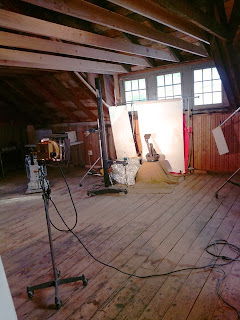 |
| A quote from designer Foti Flogeras caught my attention |
I'm up to my eyeballs finalizing a video for a perfume, "Confusion II." I'll offer it for sale in mid-January. The project, since I am new at doing videos, has probably required more time than necessary but it is a learning experience.
Among the headaches and obstacles were non-functioning video editing software (I won't mention the brand), trying to find replacement software, starting up the learning curve for the new software (I had used an older version of the other program before, without problems), and learning something about audio editing and music producing and discovering that I am not going to be the next Jay-Z. But by keeping it simple it looks like the job will get done on time.
I mention all this for two reasons. First, there are some myths out there that you can achieve fame and fortune with perfume without investing any money and without doing any work.
You can produce a small quantity of perfume for perhaps a few hundred dollars -- but you can't develop and successfully sell a perfume without hard work. In fact, the less money you have to spend, the harder you will have to work. I'll write more about that another day.
But today (and for the last few weeks!) the video has been on my mind. The questions you might ask are, "Why a video for perfume?" and "Won't it cost a lot of money?" Let me start with the first question.
The December 2013 issue of Beauty Packaging magazine ran a report from Luxe Pack Monaco, a trade show of Luxury packaging for fragrances and cosmetics. The article quoted Foti Flogeras, a European-based fragrance package designer with clients in the Middle East and China. Flogeras told the editors, "You have to win over Chinese consumers with the packaging because often they have no experience with the product -- what's inside."
Isn't this exactly our situation when we small perfume marketers try to put out a new perfume? We have no history, we don't have millions of followers on Twitter or Facebook, and nobody is ready to rush the retail stores to purchase our perfume the minute it hits the shelves.
So we must generate buzz. Video is one device that can help do that.
Notice that we are all carrying video cameras in our pockets. What smartphone can't shoot video? So the first tool is at hand although other cameras may be more appropriate, depending on the "script," but we don't need to do it in Panavision.
When my first video editing software pooped out on me I was surprised to discover how may affordable options were available -- in the "under $100" price range. (As mentioned above, developing and selling your own perfume does require that you be prepared to spend money!) So now I'm using (learning to use!) one of these and the work is progressing nicely.
But what about all else? The cost, the music, the special effects, the props and sets? Here's where, if your budget is as limited as mine is, you have to get creative. You can get creative by reaching out and seeing what's going on right in your own neighborhood. Lots of young people are into all this. Or look at YouTube, look at websites featuring video, look at store displays for perfume that attract your attention (if you can find any.)
Selling an abstract product like perfume requires creative thought and strategizing. And it requires money, some money, but not necessarily a whole lot.
Start keeping your eyes open for video ideas. And don't forget to pay attention to the commercials on TV.


